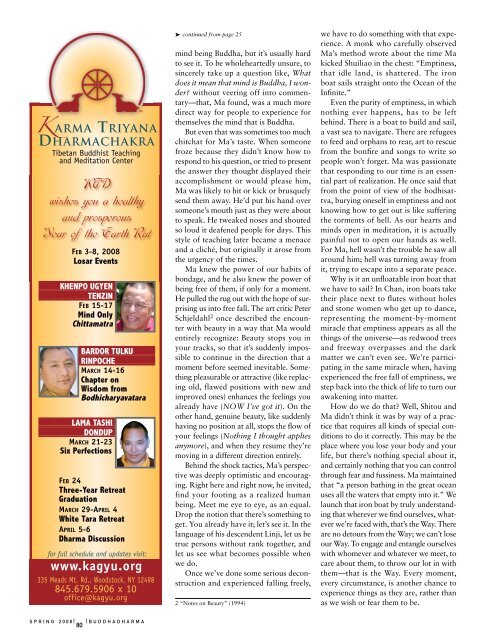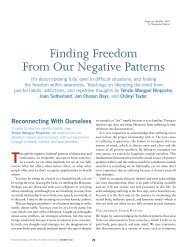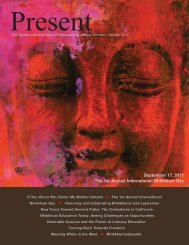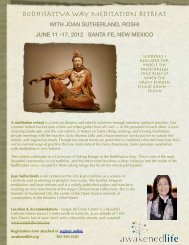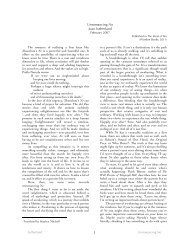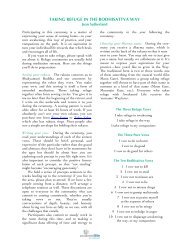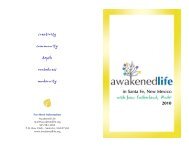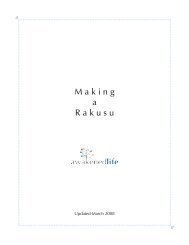Koans for Troubled Times - Awakened Life
Koans for Troubled Times - Awakened Life
Koans for Troubled Times - Awakened Life
You also want an ePaper? Increase the reach of your titles
YUMPU automatically turns print PDFs into web optimized ePapers that Google loves.
KARMA TRIYANA<br />
DHARMACHAKRA<br />
Tibetan Buddhist Teaching<br />
and Meditation Center<br />
KTD<br />
wishes you ahealthy<br />
and prosperous<br />
Year of the Earth Rat<br />
FEB 3-8, 2008<br />
Losar Events<br />
KHENPO UGYEN<br />
TENZIN<br />
FEB 15-17<br />
Mind Only<br />
Chittamatra<br />
BARDOR TULKU<br />
RINPOCHE<br />
MARCH 14-16<br />
Chapter on<br />
Wisdom from<br />
Bodhicharyavatara<br />
LAMA TASHI<br />
DONDUP<br />
MARCH 21-23<br />
Six Perfections<br />
FEB 24<br />
Three-Year Retreat<br />
Graduation<br />
MARCH 29-APRIL 4<br />
White Tara Retreat<br />
APRIL 5-6<br />
Dharma Discussion<br />
<strong>for</strong> full schedule and updates visit:<br />
www.kagyu.org<br />
335 Meads Mt. Rd., Woodstock, NY 12498<br />
845.679.5906 x10<br />
office@kagyu.org<br />
➤ continued from page 25<br />
mind being Buddha, but it’s usually hard<br />
to see it. To be wholeheartedly unsure, to<br />
sincerely take up a question like, What<br />
does it mean that mind is Buddha, I wonder?<br />
without veering off into commentary—that,<br />
Ma found, was a much more<br />
direct way <strong>for</strong> people to experience <strong>for</strong><br />
themselves the mind that is Buddha.<br />
But even that was sometimes too much<br />
chitchat <strong>for</strong> Ma’s taste. When someone<br />
froze because they didn’t know how to<br />
respond to his question, or tried to present<br />
the answer they thought displayed their<br />
accomplishment or would please him,<br />
Ma was likely to hit or kick or brusquely<br />
send them away. He’d put his hand over<br />
someone’s mouth just as they were about<br />
to speak. He tweaked noses and shouted<br />
so loud it deafened people <strong>for</strong> days. This<br />
style of teaching later became a menace<br />
and a cliché, but originally it arose from<br />
the urgency of the times.<br />
Ma knew the power of our habits of<br />
bondage, and he also knew the power of<br />
being free of them, if only <strong>for</strong> a moment.<br />
He pulled the rug out with the hope of surprising<br />
us into free fall. The art critic Peter<br />
Schjeldahl 2 once described the encounter<br />
with beauty in a way that Ma would<br />
entirely recognize: Beauty stops you in<br />
your tracks, so that it’s suddenly impossible<br />
to continue in the direction that a<br />
moment be<strong>for</strong>e seemed inevitable. Something<br />
pleasurable or attractive (like replacing<br />
old, flawed positions with new and<br />
improved ones) enhances the feelings you<br />
already have (NOW I’ve got it). On the<br />
other hand, genuine beauty, like suddenly<br />
having no position at all, stops the flow of<br />
your feelings (Nothing I thought applies<br />
anymore), and when they resume they’re<br />
moving in a different direction entirely.<br />
Behind the shock tactics, Ma’s perspective<br />
was deeply optimistic and encouraging.<br />
Right here and right now, he invited,<br />
find your footing as a realized human<br />
being. Meet me eye to eye, as an equal.<br />
Drop the notion that there’s something to<br />
get. You already have it; let’s see it. In the<br />
language of his descendent Linji, let us be<br />
true persons without rank together, and<br />
let us see what becomes possible when<br />
we do.<br />
Once we’ve done some serious deconstruction<br />
and experienced falling freely,<br />
2 “Notes on Beauty” (1994)<br />
we have to do something with that experience.<br />
A monk who carefully observed<br />
Ma’s method wrote about the time Ma<br />
kicked Shuiliao in the chest: “Emptiness,<br />
that idle land, is shattered. The iron<br />
boat sails straight onto the Ocean of the<br />
Infinite.”<br />
Even the purity of emptiness, in which<br />
nothing ever happens, has to be left<br />
behind. There is a boat to build and sail,<br />
a vast sea to navigate. There are refugees<br />
to feed and orphans to rear, art to rescue<br />
from the bonfire and songs to write so<br />
people won’t <strong>for</strong>get. Ma was passionate<br />
that responding to our time is an essential<br />
part of realization. He once said that<br />
from the point of view of the bodhisattva,<br />
burying oneself in emptiness and not<br />
knowing how to get out is like suffering<br />
the torments of hell. As our hearts and<br />
minds open in meditation, it is actually<br />
painful not to open our hands as well.<br />
For Ma, hell wasn’t the trouble he saw all<br />
around him; hell was turning away from<br />
it, trying to escape into a separate peace.<br />
Why is it an unfloatable iron boat that<br />
we have to sail? In Chan, iron boats take<br />
their place next to flutes without holes<br />
and stone women who get up to dance,<br />
representing the moment-by-moment<br />
miracle that emptiness appears as all the<br />
things of the universe—as redwood trees<br />
and freeway overpasses and the dark<br />
matter we can’t even see. We’re participating<br />
in the same miracle when, having<br />
experienced the free fall of emptiness, we<br />
step back into the thick of life to turn our<br />
awakening into matter.<br />
How do we do that? Well, Shitou and<br />
Ma didn’t think it was by way of a practice<br />
that requires all kinds of special conditions<br />
to do it correctly. This may be the<br />
place where you lose your body and your<br />
life, but there’s nothing special about it,<br />
and certainly nothing that you can control<br />
through fear and fussiness. Ma maintained<br />
that “a person bathing in the great ocean<br />
uses all the waters that empty into it.” We<br />
launch that iron boat by truly understanding<br />
that wherever we find ourselves, whatever<br />
we’re faced with, that’s the Way. There<br />
are no detours from the Way; we can’t lose<br />
our Way. To engage and entangle ourselves<br />
with whomever and whatever we meet, to<br />
care about them, to throw our lot in with<br />
them—that is the Way. Every moment,<br />
every circumstance, is another chance to<br />
experience things as they are, rather than<br />
as we wish or fear them to be.<br />
s p r i n g 2008| 80<br />
| b u d d h a d h a r m a


